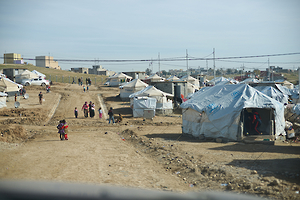Iraq: ISIS Escapees Describe Systematic Rape
Yezidi Survivors in Need of Urgent Care
The extremist group Islamic State (also known as ISIS) has carried out systematic rape and other sexual violence against Yezidi women and girls in northern Iraq. Human Rights Watch conducted research in the town of Dohuk in January and February 2015, including interviewing 20 women and girls who escaped from ISIS, and reviewing ISIS statements about the subject.

The Khanke IDP camp outside of Dohuk is home to more than 18,000 Yezidis and other Iraqi families who were displaced by the conflict.
Human Rights Watch documented a system of organized rape and sexual assault, sexual slavery, and forced marriage by ISIS forces. Such acts are war crimes and may be crimes against humanity. Many of the women and girls remain missing, but the survivors now in Iraqi Kurdistan need psychosocial support and other assistance.
“ISIS forces have committed organized rape, sexual assault, and other horrific crimes against Yezidi women and girls,” said Liesl Gerntholtz, women’s rights director at Human Rights Watch. “Those fortunate enough to have escaped need to be treated for the unimaginable trauma they endured.”
Researcher Interview: These Yezidi girls escaped ISIS. Now what?
ISIS forces took several thousand Yezidi civilians into custody in northern Iraq’s Nineveh province in August 2014, according to Kurdistan officials and community leaders. Witnesses said that fighters systematically separated young women and adolescent girls from their families and other captives and moved them from one location to another inside Iraq and Syria.
The 11 women and 9 girls Human Rights Watch interviewed had escaped between September 2014 and January 2015. Half, including two 12-year-old girls, said they had been raped – some multiple times and by several ISIS fighters. Nearly all of them said they had been forced into marriage; sold, in some cases a number of times; or given as “gifts.” The women and girls also witnessed other captives being abused.
Human Rights Watch also interviewed more than a dozen international and local service providers, medical workers, Kurdish officials, community leaders, and activists who corroborated these accounts. A local doctor treating female survivors in Dohuk told Human Rights Watch that of the 105 women and girls she had examined, 70 appeared to have been raped in ISIS captivity.
All of the women and girls interviewed exhibited signs of acute emotional distress. Many remain separated from relatives and sometimes their entire families, who were either killed by ISIS or remain in ISIS captivity. Several said they had attempted suicide during their captivity or witnessed suicide attempts to avoid rape, forced marriage, or forced religious conversion.
In October 2014, ISIS acknowledged in its publication Dabiq that its fighters had given captured Yezidi women and girls to its fighters as “spoils of war.” ISIS has sought to justify sexual violence claiming that Islam permits sex with non-Muslim “slaves,” including girls, as well as beating and selling them. The statements are further evidence of a widespread practice and a systematic plan of action by ISIS, Human Rights Watch said.
ISIS commanders should immediately release all civilian detainees, reunite children with their families, and end forced marriages and religious conversions, Human Rights Watch said. They should take all necessary action to end rape and other sexual violence by ISIS fighters. International and local actors who have influence with ISIS should press the group to take these actions.
In 2014 the Kurdistan Regional Government (KRG) absorbed more than 637,000 displaced people from Nineveh province alone, and made significant efforts to provide health and other services to Yezidi women and girls who have escaped ISIS. However, there have been flaws and gaps in health care, Human Rights Watch said. Some of those interviewed said they underwent medical tests but did not know the purpose and were never told the results.
The director general for health in Dohuk told Human Rights Watch that local authorities had identified fewer than 150 women and girls who had escaped from ISIS and that only about 100 had received medical treatment. According to the KRG Directorate of Yezidi Affairs, 974 Yezidis had escaped ISIS as of March 15, 2015, including 513 women and 304 children.
The women and girls need trauma support and ongoing counselling, Human Rights Watch said. Not all had immediate access to treatment for injuries; emergency contraception; safe and legal abortion services, including sexual and reproductive health access; and psychosocial support.
KRG authorities should try to close gaps in medical care and psychosocial support for the Yezidi girls and women and ensure that doctors provide survivors with results of tests they undergo and information on the services available to them, Human Rights Watch said. The KRG should also develop a plan to assist children born from rape to ensure adequate services and protection for them and their mothers. In addition, the KRG should invest in employment skills training and livelihood schemes to help reintegrate women into daily life.
“Yezidi women and girls who escaped ISIS still face enormous challenges and continuing trauma from their experience,” Gerntholtz said. “They need urgent help and support to recover their health and move on with their lives.”
Source: Human Rights Watch
- 323 reads
Human Rights
Ringing FOWPAL’s Peace Bell for the World:Nobel Peace Prize Laureates’ Visions and Actions

Protecting the World’s Cultural Diversity for a Sustainable Future

The Peace Bell Resonates at the 27th Eurasian Economic Summit

Declaration of World Day of the Power of Hope Endorsed by People in 158 Nations

Puppet Show I International Friendship Day 2020

